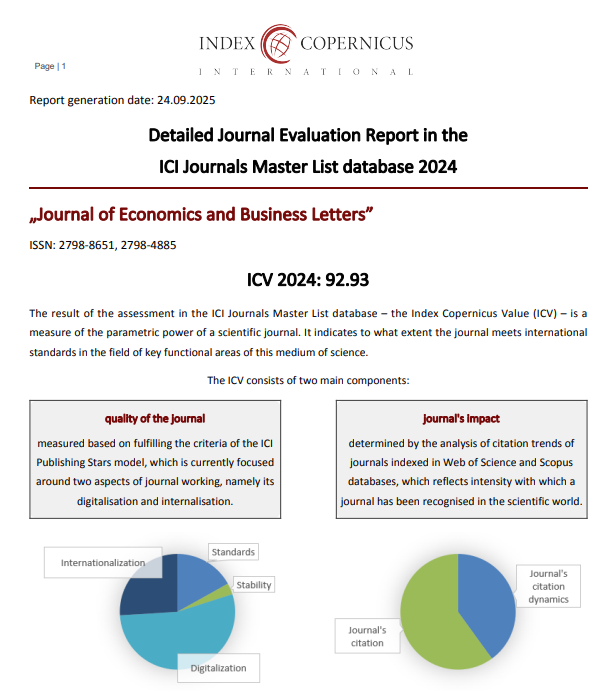From watchdog to catalyst: How emotional intelligence, organizational culture, and training drive auditor performance in Indonesia’s inspectorate general
DOI:
https://doi.org/10.55942/jebl.v5i2.880Keywords:
auditor performance, emotional intelligence, organizational culture, training and development, public sector auditing, good governanceAbstract
This study tests a governance-grounded model in which emotional intelligence (EI), organizational culture (OC), and education–training (Diklat) jointly predict auditor job performance within the Inspectorate General of the Indonesian Ministry of Religious Affairs. Using a cross-sectional explanatory survey of 92 government auditors, we measured EI (self-awareness, self-regulation, motivation, empathy, social skills), OC (integrity, discipline, learning orientation, team/people focus), Diklat (relevance, delivery, instructor quality, facilities), and performance (ability, initiative, timeliness, quality, communication) on five-point Likert scales, with supervisor input to reduce common-method bias. All instruments demonstrated strong reliability (α = .909–.965) and satisfactory validity. Bivariate regressions showed large positive effects on performance for EI (R² = .693), OC (R² = .654), and Diklat (R² = .756). In a joint OLS model, all predictors remained significant with standardized coefficients: Diklat (β = .497, p < .001), EI (β = .346, p < .001), and OC (β = .155, p = .044), indicating training has the largest unique contribution once shared variance is partialled out. Practically, results argue for practice-embedded, EI-aware training; culture-by-design that emphasizes discipline and values-based decisions; and systematic follow-up on audit recommendations. The findings reinforce the shift of internal audit from watchdog to consultant and catalyst, linking human-system levers to auditable improvements in public-sector governance. Limitations include cross-sectional design and potential construct overlap; future research should adopt lagged measures and objective performance indicators.
References
Gramling, A. A., Maletta, M. J., Schneider, A., & Church, B. K. (2004). The role of the internal audit function in corporate governance: A synthesis of the extant internal auditing literature and directions for future research. Auditing: A Journal of Practice & Theory, 23(1), 49–74. https://doi.org/10.2308/aud.2004.23.1.49
Grobelny, J. (2021). Emotional intelligence and job performance: A meta-analysis. International Journal of Workplace Health Management, 14(4), 427–454.
Hartnell, C. A., Ou, A. Y., & Kinicki, A. (2011). Organizational culture and organizational effectiveness: A meta-analytic investigation of the competing values framework’s theoretical suppositions. Journal of Applied Psychology, 96(4), 677–694. https://doi.org/10.1037/a0021987
Hartnell, C. A., Kinicki, A. J., Lambert, L. S., Fugate, M., & Doyle Corner, P. (2019). A meta-analytic test of organizational culture’s association with elements of an organization’s system and its relative predictive validity on organizational outcomes. Journal of Applied Psychology, 104(6), 832–850. https://doi.org/10.1037/apl0000380
Joseph, D. L., & Newman, D. A. (2010). Emotional intelligence: An integrative meta-analysis and cascading model. Journal of Applied Psychology, 95(1), 54–78. https://doi.org/10.1037/a0017286
O’Boyle, E. H., Humphrey, R. H., Pollack, J. M., Hawver, T. H., & Story, P. A. (2011). The relation between emotional intelligence and job performance: A meta-analysis. Journal of Organizational Behavior, 32(5), 788–818. https://doi.org/10.1002/job.714
Rahayu, S., Sriwidodo, U., & Suryanto, T. (2020). Internal auditors’ role indicators and their support of good governance in Indonesian local government. Cogent Business & Management, 7(1), 1751020. https://doi.org/10.1080/23311975.2020.1751020
Robbins, Stephen P. 2006. Perilaku Organisasi, Konsep, Kontroversi, Aplikasi, Alih Bahasa Hadyana Pujaatmaka dan Benyamin Molan, Prenhallindo, Jakarta.
Tharenou, P., Saks, A. M., & Moore, C. (2007). A review and critique of research on training and organizational-level outcomes. Human Resource Management Review, 17(3), 251–273. https://doi.org/10.1016/j.hrmr.2007.01.002
Williyanto, D. B., Moeljadi, & Soedjatno. (2025). The effectiveness of internal audit in promoting good public governance: Evidence from Indonesian local government. Jurnal Reviu Akuntansi dan Keuangan, 15(2), 123–139. (Publisher PDF). https://doi.org/10.22219/jrak.v15i2.38056
Downloads
Published
How to Cite
Issue
Section
License
Copyright (c) 2025 Kelik Nugroho

This work is licensed under a Creative Commons Attribution 4.0 International License.
















